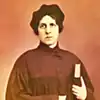Deborah
According to the Book of Judges, Deborah (Hebrew: דְּבוֹרָה, Dəḇōrā, "bee") was a prophetess of the God of the Israelites, the fourth Judge of pre-monarchic Israel and the only female judge mentioned in the Hebrew Bible. Many scholars contend that the phrase, "a woman of Lappidot", as translated from biblical Hebrew in Judges 4:4 denotes her marital status as the wife of Lapidoth.[1] Alternatively, "lappid"[1] translates as "torch" or "lightning", therefore the phrase, "woman of Lappidot" could be referencing Deborah as a "fiery woman."[2] Deborah told Barak, an Israelite general[1] from Kedesh in Naphtali, that God commanded him to lead an attack against the forces of Jabin king of Canaan and his military commander Sisera (Judges 4:6–7); the entire narrative is recounted in chapter 4.
Deborah | |
|---|---|
 Deborah as portrayed in Promptuarii Iconum Insigniorum (1553) | |
| Other names | Debora, Débora, Dvora, Debra |
| Occupation(s) | Prophetess of God, Fourth Judge of Israel |
| Predecessor | Shamgar |
| Successor | Gideon |
| Spouse | Lapidoth (possibly) |
| Judges in the Hebrew Bible שופטים |
|---|
| Italics indicate individuals not explicitly described as judges |
| Book of Exodus |
| Book of Joshua |
| Book of Judges |
| First Book of Samuel |
Judges 5 gives the same story in poetic form. This passage, often called The Song of Deborah, may date to as early as the twelfth century BCE,[3] and is perhaps the earliest sample of Hebrew poetry.[4]
Bible narrative
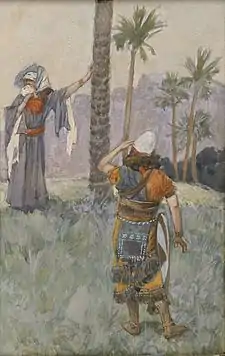
In the Book of Judges, it is stated that Deborah was a prophet, a judge of Israel and the wife of Lapidoth.[5][6] She rendered her judgments beneath a date palm tree between Ramah in Benjamin and Bethel in the land of Ephraim.[7]
The people of Israel had been oppressed by Jabin, the king of Canaan, whose capital was Hazor, for twenty years. Stirred by the wretched condition of Israel she sends a message to Barak, the son of Abinoam, at Kedesh of Naphtali, and tells him that the Lord God had commanded him to muster ten thousand troops of Naphtali and Zebulun and concentrate them upon Mount Tabor, the mountain at the northern angle of the great plain of Esdraelon. At the same time she states that the Lord God of Israel will draw Sisera, commander of Jabin's army, to the River Kishon. Barak declines to go without the prophet. Deborah consents, but declares that the glory of the victory will therefore belong to a woman. As soon as the news of the rebellion reaches Sisera, he collects nine hundred chariots of iron and a host of people.[6]
Then Deborah said, according to Judges 4:14:
"Go! This is the day the Lord has given Sisera into your hands. Has not the Lord gone ahead of you?" So Barak went down Mount Tabor, with ten thousand men following him.
As Deborah prophesied, a battle is fought (led by Barak), and Sisera is completely defeated. He escapes on foot while his army is pursued as far as Harosheth Haggoyim and destroyed. Sisera comes to the tent of Jael and lies down to rest. He asks for a drink, she gives him milk and while he is asleep she hammers a tent-pin through his temple.[6]
The Biblical account of Deborah ends with the statement that after the battle, there was peace in the land for 40 years (Judges 5:31).
The Song of Deborah
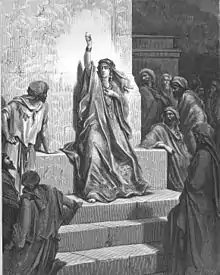
The Song of Deborah is found in Judges 5:2–31 and is a victory hymn, sung by Deborah and Barak, about the defeat of Canaanite adversaries by some of the tribes of Israel. The song itself differs slightly from the events described in Judges 4. The song mentions six participating tribes: Ephraim, Benjamin, Machir—a group associated with the Tribe of Manasseh—Zebulun, Issachar and Naphtali, as opposed to the two tribes in Judges 4:6 (Naphtali and Zebulun) and does not mention the role of Jabin (king of Hazor).[8] The song also rebukes three other tribes (Reuben, Dan, and Asher) for their lack of patriotism.[9] Michael Coogan writes that for the redactors of the Song of Deborah, that the Canaanite general Sisera ends up being murdered by a woman (Jael)—the ultimate degradation—"is a further sign that Yahweh ultimately is responsible for the victory".[10]
Though the presence of victory hymns is not uncommon in the Hebrew Bible, the Song of Deborah is unusual in that it is a hymn that celebrates a military victory of two women: Deborah, the prophetess and Jael, the warrior.[11] Jael—the heroine of the Song of Deborah—shares parallels with the main character of the Book of Judith, who uses her beauty and charm to kill an Assyrian general who has besieged her city, Bethulia.
The Song of Deborah is commonly identified as among the oldest texts of the Bible, but the date of its composition is controversial. Some claim a date as early as the 12th century BCE,[3] while others claim it to be as late as the 3rd century BCE. Based on its language and content, the current consensus is that the song was written no earlier than the 7th century BCE.[12]
Traditional chronology
Traditional Jewish chronology places Deborah's 40 years of judging Israel (Judges 5:31) from 1107 BC until her death in 1067 BC.[13] The Dictionary of World Biography: The Ancient World claims that she might have lived in the period between 1200 BC to 1124 BC.[14] Based on archaeological findings, different biblical scholars have argued that Deborah's war with Sisera best fits the context of either the second half of the 12th century BC[15] or the second half of the 11th century BC.[16]
Gallery
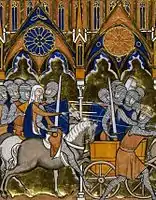 Deborah and Barak in a miniature from the 13th-century Psalter of St. Louis
Deborah and Barak in a miniature from the 13th-century Psalter of St. Louis Jael, Deborah, and Barak (c. 1630) by Salomon de Bray
Jael, Deborah, and Barak (c. 1630) by Salomon de Bray A statue of Deborah (1792) in Aix-en-Provence, France
A statue of Deborah (1792) in Aix-en-Provence, France
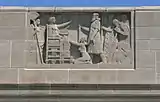 Deborah Judging Israel, west-facing panel at the northwest corner of the Nebraska State Capitol
Deborah Judging Israel, west-facing panel at the northwest corner of the Nebraska State Capitol
See also
References
- Van Wijk-Bos, Johanna WH. The End of the Beginning: Joshua and Judges. Wm. B. Eerdmans Publishing, 2019.
- García Bachmann, Mercedes L., Ahida E. Pilarski, and Barbara E. Reid. "Judges." Wisdom commentary (2018).
- Coogan, Michael David (2006). A Brief Introduction to the Old Testament: The Hebrew Bible in its Context. Oxford, England: Oxford University Press. p. 216. ISBN 978-0195139112.
- Cook, Stanley (1911). . In Chisholm, Hugh (ed.). Encyclopædia Britannica. Vol. 7 (11th ed.). Cambridge University Press. p. 904.
- Judges 4:4
- "Deborah", Jewish Encyclopedia.
- Judges 4:5
- Nelson, Richard (2006). "Judges". The Harper Collins Study Bible, rev. ed. Eds. Attridge, Harold & Wayne Meeks. New York: HarperCollins, p. 353.
- Singer, Isidore, ed. (1912). "Deborah, The Song of". The Jewish Encyclopedia. Vol. 4 (3 ed.). New York: Funk & Wagnalls. p. 490.
- Coogan, Michael David (2006). A Brief Introduction to the Old Testament: The Hebrew Bible in its Context. Oxford, England: Oxford University Press. p. 217. ISBN 978-0195139112.
- Niditch, Susan (2011). "Tales of Deborah and Jael, Warrior Women". Judges: a commentary. The Old Testament Library. Louisville, Kentucky: Westminster John Knox Press. pp. 59–67. ISBN 978-1611644937.
- Frolov, S. (2011). "How Old is the Song of Deborah?". Journal for the Study of the Old Testament. 36 (2): 163–84. doi:10.1177/0309089211423720. S2CID 170121702.
'To be sure, the consensus outlined here is by no means perfect; several publications that appeared in the 1980s and 1990s diverge from it, sometimes in a major way. In particular, Alberto Soggin, Ulrike Schorn, and Barnabas Lindars see the Song, or at least the bulk thereof, as a product of the early monarchy; Ulrike Bechmann and Manfred Görg place it in the late pre-exilic period; Michael Waltisberg advocates early post-exilic provenance (fifth to third centuries BCE); and B.-J. Diebner shifts the composition's date all the way to the turn of the eras.' (p. 165); 'With the text's internal parameters and the external conditions of its existence considered in a systematic fashion, what we know as Judg. 5.2–31a presents itself as an integral part of the Deuteronomistic oeuvre and should be dated, accordingly, between c. 700 and c. 450 BCE.' (p. 183)
- Jewish History: Deborah the Prophetess, Chabad.
- Northen Magill, Frank and Christina J. Moose (2003-01-23). "Deborah". Dictionary of World Biography: The Ancient World. Taylor & Francis. ISBN 978-1-57958040-7. Retrieved 1 April 2013.
- Albright, W. F. (1937). "Further Light on the History of Israel from Lachish and Megiddo". Bulletin of the American Schools of Oriental Research. 68 (68): 22–26. doi:10.2307/3218855. JSTOR 3218855. S2CID 163435967.
- Mayes, A. D. H. (1969). "The Historical Context of the Battle against Sisera". Vetus Testamentum. 19 (3): 353–360. doi:10.2307/1516506. JSTOR 1516506.
Further reading
- Bird, Phyllis (1974). "Images of Women in the Old Testament". In Ruether, Rosemary Radford (ed.). Religion and Sexism: Images of Women in the Jewish and Christian Traditions. Simon & Schuster. ISBN 0-671-21692-9.
- Brown, Cheryl Anne (1992). No Longer be Silent: First Century Jewish Portraits of Biblical Women: Studies in Pseudo-Philo's Biblical Antiquities and Josephus's Jewish Antiquities. Louisville, KY: Westminster J. Knox Press. ISBN 0-664-25294-X.
- Deen, Edith (1955). All the Women of the Bible. New York: Harper & Row.
- Lacks, Roslyn (1979). Women and Judaism: Myth, History, and Struggle. Garden City, NY: Doubleday. ISBN 0-385-02313-8.
- Otwell, John H. (1977). And Sarah Laughed: the Status of Woman in the Old Testament. Philadelphia: Westminster Press. ISBN 0-664-24126-3.
- Phipps, William E. (1992). Assertive Biblical Women. Westport, CT: Greenwood Press. ISBN 0-313-28498-9.
- Schroeder, Joy A. (2014). Deborah's Daughters: Gender Politics and Biblical Interpretation. New York: Oxford University Press. ISBN 978-0-19-999104-4.
- Williams, James G. (1982). Women Recounted: Narrative Thinking and the God of Israel. Sheffield: Almond Press. ISBN 0-907459-18-8.
External links
- Book of Judges article, Jewish Encyclopedia
- Debbora, Catholic Encyclopedia
- Biblical Hebrew Poetry - Reconstructing the Original Oral, Aural and Visual Experience
- Song of Deborah (Judges 5) Reconstructed

